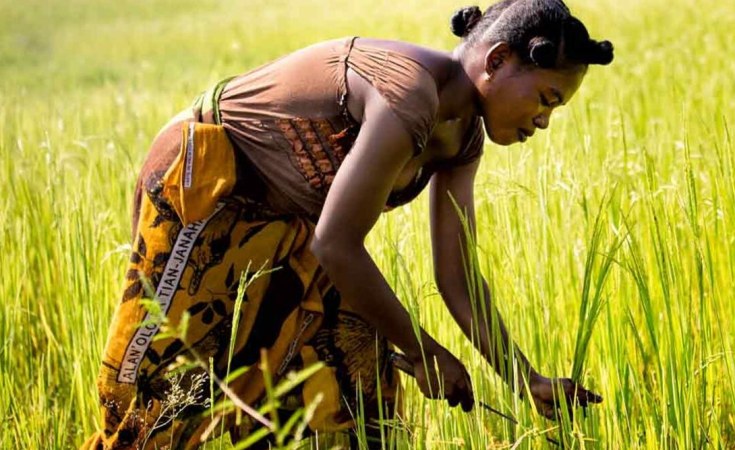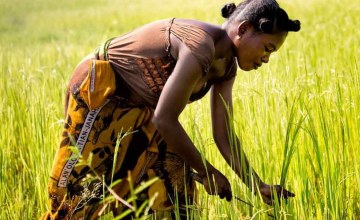From Sudan to Mali, Senegal to Mozambique, and Zambia to Mauritania, women are changing the face of agriculture, adapting and innovating to tackle the challenges of climate change, and feeding the continent's growing population.
African women are actors along the entire agricultural value chain, as farmers, livestock breeders, food processors, traders, farm workers, entrepreneurs and consumers.
Through the African Development Bank's Technologies for African Transformation (TAAT) initiative, millions of African women have gained access to new agricultural technologies that have boosted their crop yields, enabling them to tap new markets and increase their incomes .
Improved seeds can help Africa's smallholder farmers, the majority of whom are women, to produce high crop yields even in areas plagued by climate change-related drought, floods and locust swarms that can destroy an entire harvest. Add in the constraints recently imposed because of the COVID-19 pandemic, and it's a tough time to be a subsistence farmer.
Fathia Mohamed Ahmed, who belongs to a collective of two dozen women farmers in Sudan's Darfur region is one such farmer. Through the TAAT initiative, her collective has been provided with high quality seeds for cultivating sorghum, a grain suited to hot, dry conditions. Sorghum, also known as millet, yields a grain that is rich in carbohydrates, protein and other nutrients that can be made into porridge, flatbreads, and cakes.
As a result of higher yields, collective members have gained opportunities for business expansion, including selling sorghum for cash at local markets. "It is an important breakthrough for the group to start our business," Fathia said. "Our group is still in its infancy, but our focus is to grow and increase our agricultural business activities in the near future."
West across the Sahel in Mali, 54-year-old Dramane Diallo works alongside a group of women who cultivate rice in Baguinéda, in lowlands on the banks of the Niger river.
Thanks to a Bank-funded food and nutrition project, rice and cereal harvests in Mali's "rice bowl" have risen sharply, and farming families are reaping the benefits. "It used to be that you couldn't go near the embankments because they were in such poor condition. We had problems irrigating our fields," Dramane said. "But the irrigation channels have been restored and this has made my work less of a chore."
At the local market, new produce is available. Every evening, stallholder Adiaratou Traoré goes to meet growers in their fields to buy vegetables to sell the next morning. One of her customers, Ténin Traoré, is enjoying the new variety of food on offer:
"Agricultural products used to be scarce in our market. Despite the demand, what was available from farmers was expensive and poor quality. It hasn't been like that for the last two years. Now, we have a modern market, we have everything we need and the quality is good too," she said.
In neighbouring Mauritania, the government partnered with the Bank to roll out a $12 million irrigation project that has breathed new life into the west Brakna region, which is prone to droughts, food insecurity and other effects of climate change.
The development of irrigation systems and dredging of backwaters that flow out of the Senegal River has increased the arable and irrigated farmland from 300 hectares to almost 7,000 hectares.
The project has benefited local women, including Oumou Salif Diop, president of a cooperative of 150 women farmers. The women, who grow tomatoes, onions and rice among other crops, have received training under the project.
"We know how to work and how to preserve what we harvest," said Oumou. "We farm better, generating better yields and higher profits. Compared with before, there has been a huge change."
Further up the agricultural value chain is Monica Musonda, a Zambian businesswoman and CEO of food processing company Java Foods, which produces affordable and nutritious snacks made from local ingredients.
Although African women are well represented in cultivation, primary processing and as market traders, Monica is one of only few female entrepreneurs that have created large, profitable agri-businesses.
One problem is access to finance. The Bank estimates that a $15.6 billion financing gap exists for African women in agricultural value chains. Women are forced to rely on personal savings and family loans which are rarely enough to fund businesses to scale.
The Bank's Affirmative Finance Action for Women in Africa (AFAWA) adopts a three-pronged approach--improving access to finance, providing technical assistance and strengthening the enabling environment--to close that gap.
As well as supporting women farmers' access to improved seed technologies and irrigation systems, The Bank is also promoting women's transition into the most profitable segments of agricultural value chains. And with good reason: when African women thrive their societies share fully in the dividends.



